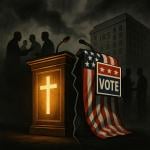THE QUESTION: Should U.S. religious groups that oppose same-sex marriage lose tax exemption?
THE RELIGION GUY’S ANSWER:
At CNN’s recent “Equality Town Hall” for Democratic presidential candidates, co-sponsored with the LGBTQ advocacy group Human Rights Campaign, anchor Don Lemon prodded Beto O’Rourke on whether “religious institutions like colleges, churches, charities” should “lose their tax-exempt status if they oppose same-sex marriage.”
O’Rourke (who identifies as Catholic) immediately answered “yes,” because “there can be no reward, no benefit, no tax break, for anyone, or any institution, any organization in America” that opposes such rights. “As president, we’re going to make that a priority.” The other candidates on stage assailed discrimination without specifying tax exemption.
Later, Pete Buttigieg (an Episcopalian in a gay marriage) agreed that religious organizations such as schools “absolutely…should not be able to discriminate” and remain tax exempt, but he said rival O’Rourke hadn’t thought through that penalizing houses of worship would create a divisive “war.”
If government were to tax income or property or end tax deductions for donations due to traditional beliefs on sexuality, the targets would include the Catholic Church, the two biggest U.S. Protestant denominations and the largest African-American church body, countless evangelical congregations, Eastern Orthodoxy, the Latter-day Saints, Orthodox Judaism, and all Muslim centers and mosques.
O’Rourke subsequently seemed to back off, emphasizing that exemptions should be denied tradition-minded agencies that provide public services like “higher education, or health care, or adoption,” whereas practices within religious congregations are not the government’s business. (That might mean government wouldn’t impose tax penalties due to sermons, parish education, or refusal of gay weddings and clergy ordinations.)
The tax proposal poses palpable danger for a vast number of U.S. institutions, whether congregations or religious schools and agencies. As the U.S. Supreme Court observed in its 1819 McCulloch decision, government’s “power to tax involves the power to destroy.”
A Los Angeles Times editorial writer called the tax idea “illiberal, anti-pluralist, and inflammatory,” not to mention “unconstitutional.” Pundits said the issue could help Republicans hold the presidency and Senate in 2020 due to fears about judicial nominations. And Senator Ben Sasse (R-Neb.) introduced a resolution that would force members of Congress to vote yes or no on whether groups should lose exemption due to their beliefs.
Some background. The U.S. Supreme Court’s 1970 Walz ruling said tax exemptions are proper for religious groups, just as with secular non-profits, because this is not government “sponsorship” that would violate the Constitution’s ban on “establishment of religion.” Further, the Court stated, both religious and secular non-profits are “beneficial and stabilizing influences” in society, so exemptions are “in the public interest.”
There appears to be solid consensus about such benefits throughout American history. Also, non-profit organizations have always been treated as tax-exempt because, by definition, they have no profits to tax. Federal courts usually forbid government to penalize individuals or groups on the basis of their viewpoints. Conservatives also argue that it would violate separation of church and state for government to take sides, stripping exemptions from groups with traditional beliefs while favoring exemptions for religions on the opposite side.
Today’s LGBTQ advocates can cite one unusual case. The Supreme Court’s 1983 Bob Jones University decision said the Internal Revenue Service properly cancelled that school’s tax exemption because its policy against interracial dating and marriage (later rescinded) was “contrary to established public policy.” Future Chief Justice William Rehnquist was the sole dissenter, not on the substance but because he thought Congress should decide such matters, not the I.R.S.
The Supreme Court ducked the religious-liberty problem when it legalized gay marriage by a one-vote margin in 2015. In the oral arguments, the Obama Administration’s chief litigator had admitted tax exemptions of, for instance, religious colleges are “certainly going to be an issue” with legalization.
Clashes between religious and gay rights are nothing new. In the 2008 anthology “Same-Sex Marriage and Religious Liberty: Emerging Conflicts,” prominent Jewish expert Marc Stern cited hundreds of court or administrative actions taken against religious conservatives, and law professor Jonathan Turley said related tax rulings had been “ill-conceived” and “hopelessly confused.”
The tax question is part of a broad dispute over religious liberty. The U.S. Commission on Civil Rights stated in 2016 that any religious exemptions should be defined “narrowly” so they do not “unduly burden” anti-discrimination policies. That same year the Democratic Party platform supported “a progressive vision of religious freedom” that “rejects the misuse of religion to discriminate.” This past May, House Democrats voted unanimous support for the Equality Act, which has also been championed by the party’s presidential hopefuls. It would explicitly forbid reliance on a federal religious liberty law in disputes over sexual orientation and gender identity rights.












